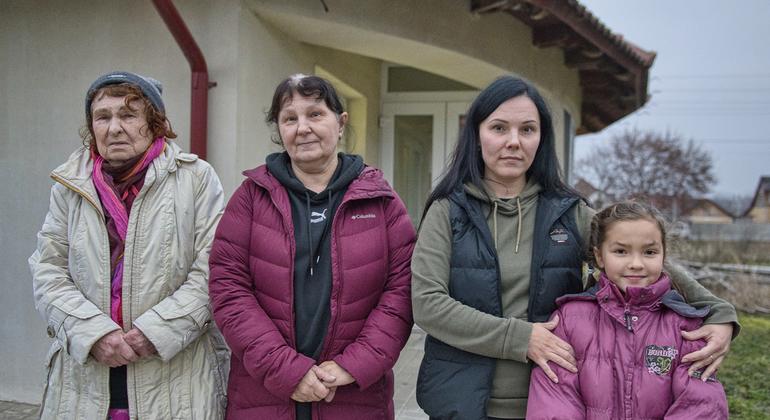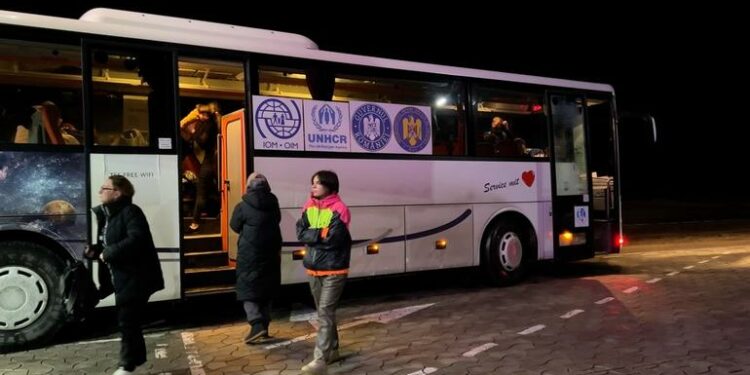Bussed to Bucharest
It was also abundantly clear to Lonnback that the thousands of people coming across the border would place a massive strain on Moldova’s scarce resources, risking a social crisis. IOM, partnering with the Moldovan authorities and the UN Refugee Agency (UNHCR), assessed the needs and worked towards finding solutions. The partners quickly established a dedicated bus service that decongested the border area, protected the vulnerable, and added a raft of services to the massive relief effort.
In the same vein, IOM has been helping people, particularly the most needy – including persons with disabilities, the elderly and those who are bedridden – to get to European Union countries by plane. To date, more than 15,000 people have entered the European Union by bus and plane with IOM support, which Lonnback believes has helped to stave off a difficult situation in Moldova, a country already wracked by poverty and social tensions.
“The critical thing is that the international community continues to help Moldova in any way it can,” he says. “We’ve seen that the Ukrainians are proud and resilient, and they really don’t want to leave their homes. But, as the attacks on infrastructure mount, and as the snow piles up, it gets more and more difficult to live, to simply exist. We have established a system that is flexible and responsive, and we can scale up in the event of large numbers of people once again fleeing Ukraine.”
About 10 per cent of those who have fled from Ukraine via Moldova have decided to stay in the country. Many of those who stayed are from cities relatively close to the border; have family and friends in Moldova; or, like people in any war, they want to remain close to their homeland.

Four generations uprooted
Svitlana, a 60-year-old real estate agent from Odesa, 40 kilometres from Moldova, is now a mainstay for four generations of women living in a small house about an hour outside Chisinau. She speaks slowly, sometimes mechanically, describing the horrors she saw and heard. Her mother quietly reads as her daughter prepares borscht and her granddaughter sketches.
But, she doesn’t cry. Svitlana gives the impression that sorrow is something she must not, will not, make time for. Her husband and sons-in-law are on the front line, and her task is to lead the family, alone.
Moldova has welcomed them warmly, she says, with humanitarian aid and simple kindness. She and her daughter are learning Romanian so they can compete on the local job market and use their skills for the benefit of their host country and themselves. Much as they appreciate the aid they have been given, they don’t want to survive on it.
“It’s sustainability through solidarity,” says Margo Baars, IOM’s Emergency Coordinator in Moldova, describing the organization’s approach. “We provide livelihood support, grants for small businesses, training and transitional shelter support, particularly to get people through this difficult winter. One of the main things we do is psychological support, because people have been through a lot and need more than just material aid.”
Leaving Ukraine along with the mothers, young children and grandmothers, are old men. Yurii, 73, vividly remembers his parents talking about the Second World War, and never thought that he would see such death and destruction in his homeland. “It’s horrible,” he says. “Every day we have victims being brought in. Every day. There are so many victims, so much grief, so many people suffering.”
Five-month-old Ivan, conceived in peace and born into war in Ukraine, is now safe in Moldova with his mother Ksenia. While heavily pregnant, Ksenia had run through a minefield as cluster bombs rained down. She fell, but escaped, with a birthmark on Ivan remaining as a memory of the day they had both cheated death.
“I want this war to end so I can enjoy motherhood to the fullest,” says Ksenia. “I think I would have gone crazy with this war without Ivan. He’s the one who brightened up all the horror.”
In this cold, miserable field, her own smile is a beam of sunlight.
Source link : https://news.un.org/en/story/2023/02/1133122
Author :
Publish date : 2023-02-04 08:00:00
Copyright for syndicated content belongs to the linked Source.




